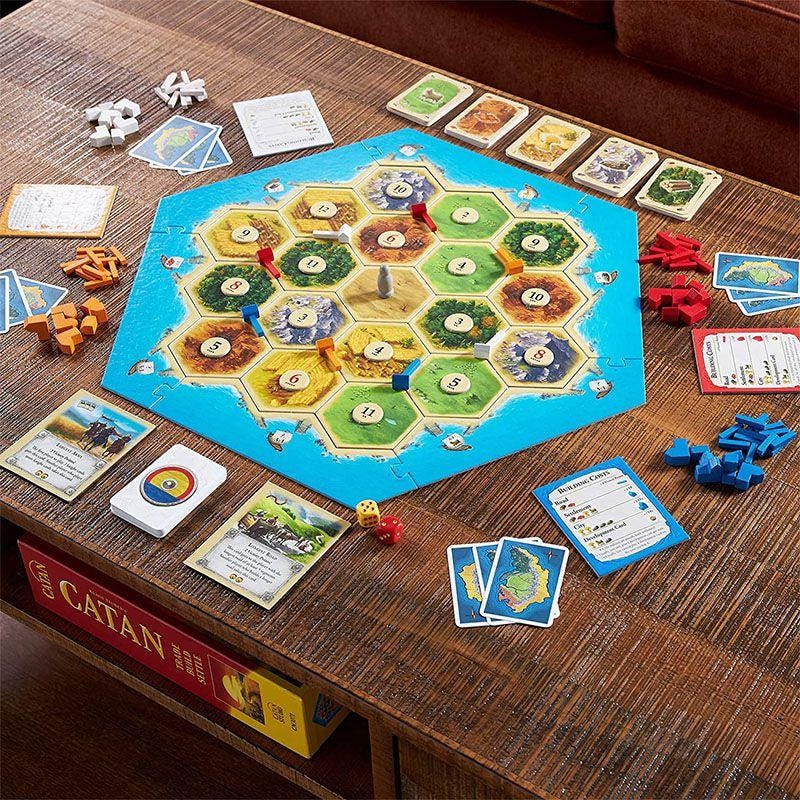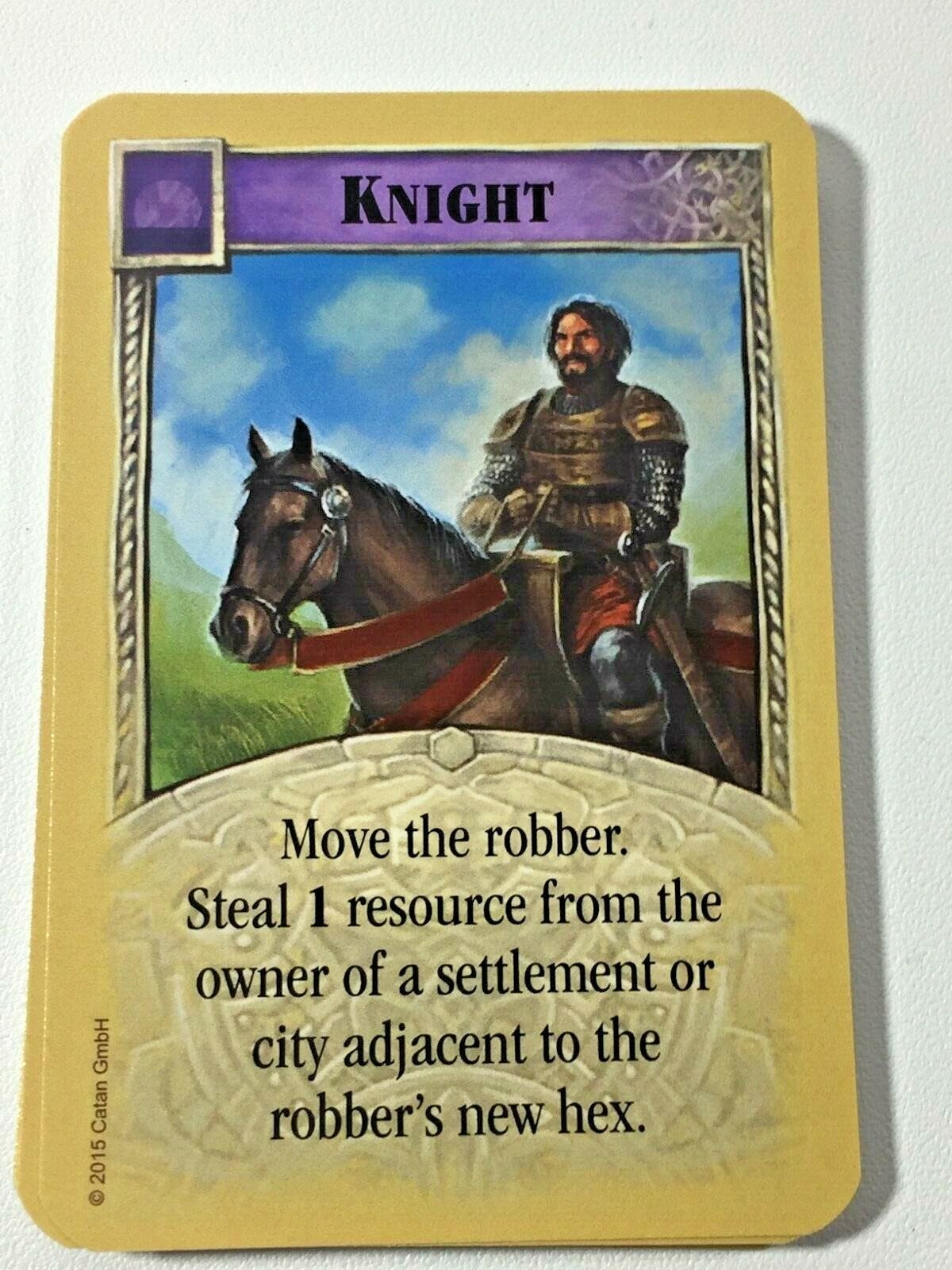Reading time: 6 minutes
A lesson from a great game
There's a popular board game called Settlers of Catan. You may have heard of it.
If you haven't, think of it as similar to Monopoly, but with three giant improvements:
It's non-linear, so instead of following the same path in a circle around the edge of the board over and over, you start in the middle of an island and you can expand in any direction you want to go.
It's not a game of elimination. The winner is just the first person to accrue ten “victory points,” not the last person standing. Most of the time, everyone playing has a decent chance to win right up to the last moment.
It's short. On average, the game takes about 45 minutes to play.
But I'm not here to teach you a board game today.
Instead, I want to show you what this board game taught me.
In the game, you gather resources. Think of them like money. You spend the resources to build things, and if you have lots of resources you're likely to do well.
Another key aspect of the game is Villages and Cities - these are the producers of your resources. Villages give you one resource at a time, and Cities give you two at a time. So obviously, Cities are better. But they also take more resources to build than Cities do.
And one more piece of the game I want to talk about is the Robber and the Knight. The Robber is a piece that moves around the island and stops your Villages and Cities from giving you resources. If he is hurting you, eventually he will move away, but it can sometimes take a while.
The Knight is a card that you can purchase for a few resources, and his job is to run the Robber out of your Village or City. This way, you don't have to wait for the Robber to decide he wants to move on - you can force it.
Ok, Jeremy - I get it, you love games. But what's the point?
There's a very important lesson in Settlers of Catan, that you can apply to your own life.
Lesson #1: Money ←→ Time ←→ Stuff ←→ Money
It's all interchangeable.
Resources are money. Cities are stuff that give you more resources. Knights are employees that give you back more time.
When you have money, you can spend it on whatever you want. You can buy stuff that will either save you time or make you more money. You can hire employees who will give you back time or generate revenue for you.
When you have time, you can spend it on whatever you want. You can build stuff that will make your life easier, if you can't afford to pay for it. You can sell your time for money (like you do everyday that you show up to work).
And when you have stuff, you can use it for whatever you want. You can operate machines that will give you back time (like vacuuming vs sweeping). You can use stuff that generates income, like a website where people can buy things from you. You can also sell stuff for more money.
Lesson #2: Build engines
Spend whatever time or money you have wisely, on things that will generate more time or money for you in the end. Buying ice cream with your last dollar is probably not going to help you.
In games, when we find a combination of pieces that creates a cycle in which time, money, and stuff and traded off for one another over and over, with an excess in at least one, we call that an engine.
Invest in engines. Common engines include investment property, or a digital product you can sell online.
Lesson #3: Trade what you have for what you need
If you're finding yourself short of one either time or money, you can trade what you have in the other category to make up for that shortfall.
For instance, let's say you have a full-time job, and the pay is ok. But between that and your personal obligations, whether they're family or pets or something else, you're just burned out. You have no free time and are at the end of your rope.
One answer is to trade money for more time. Hire a dog walker. Or a babysitter. Or a house cleaner.
If you could get back two hours per week that you usually spend doing a deep clean of your home on the weekend, you can use that to reduce your feeling of burnout.
You could sleep in for once. Or have coffee with a friend you never get to see anymore. Or maybe just take a rejuvenating walk in nature.
The inverse is also true. Maybe you are only working part-time and it's your wallet that's feeling the burnout. If you have time to spare, then you can trade in that time for money. You can either cut the babysitter or housecleaner from your budget and handle those things yourself with your extra time. Or you could get a second part-time job to increase your pay.
These things are obvious.
Lesson #4: Optimize in one area to relieve pressure in another
In Scrumify Your Life I talk about prioritizing aggressively with the Machete and the Scalpel. Here's the link for a refresher: https://jeremyrandall.substack.com/i/84095970/prioritize-aggressively
You can use these techniques to prioritize your time, your finances, and your stuff. Slash the least important things out of your life. Carve the more important things down to their core.
And if you can make space in one of the areas in your life, then you can trade that in to relieve the others.
You're burned out and your bank account is empty? Focus on one or the other - either Machete & Scalpel your schedule or your budget. And when you find a way to make space in one or the other, you can trade it to make room in the one that you couldn't slice and dice as easily.
Lesson #5: The Goal is to win
When we're playing this game, the object isn't to hire Knights or build Cities, nor is it to have the most resources. It's to win by getting those 10 victory points.
Victory Points have absolutely no use in the game except to win.
Victory Points are that walk in nature you're trying to find time for.
The goal of prioritizing, slashing, carving, and then trading between different parts of your life, is to win. It's about increasing the quality of your life.
So when you've found enough time in your schedule that you can make more money and still have extra time, or you've found enough money that you can spend it to get back time and not be broke, it's ok if you start spending it on stuff that doesn't contribute to your “engine.”
Like ice cream.
Eating good ice cream is how you know you're winning at life.
Subscribe to my newsletter to get it sent directly to your email inbox every week, and connect with me on LinkedIn at https://linkedin.com/in/scrumify.
Whenever you're ready, here's how I can help:
I've created a framework for Personal Agility called Scrumify. Click this link to read it.
Grab a copy of the Scrumify Workbook, a low-cost Scrum Master proxy to help you use the framework.
If you're trying to Scrumify something big in your life and want to work with me, I can be your Personal Scrum Master. Contact me here.
I offer free coaching calls for anyone who needs them, depending upon availability. Read more here.
I occasionally host cohort programs for aspiring Scrum Masters looking for their first experience on a Scrum Team. Click here to sign up for the next one.








